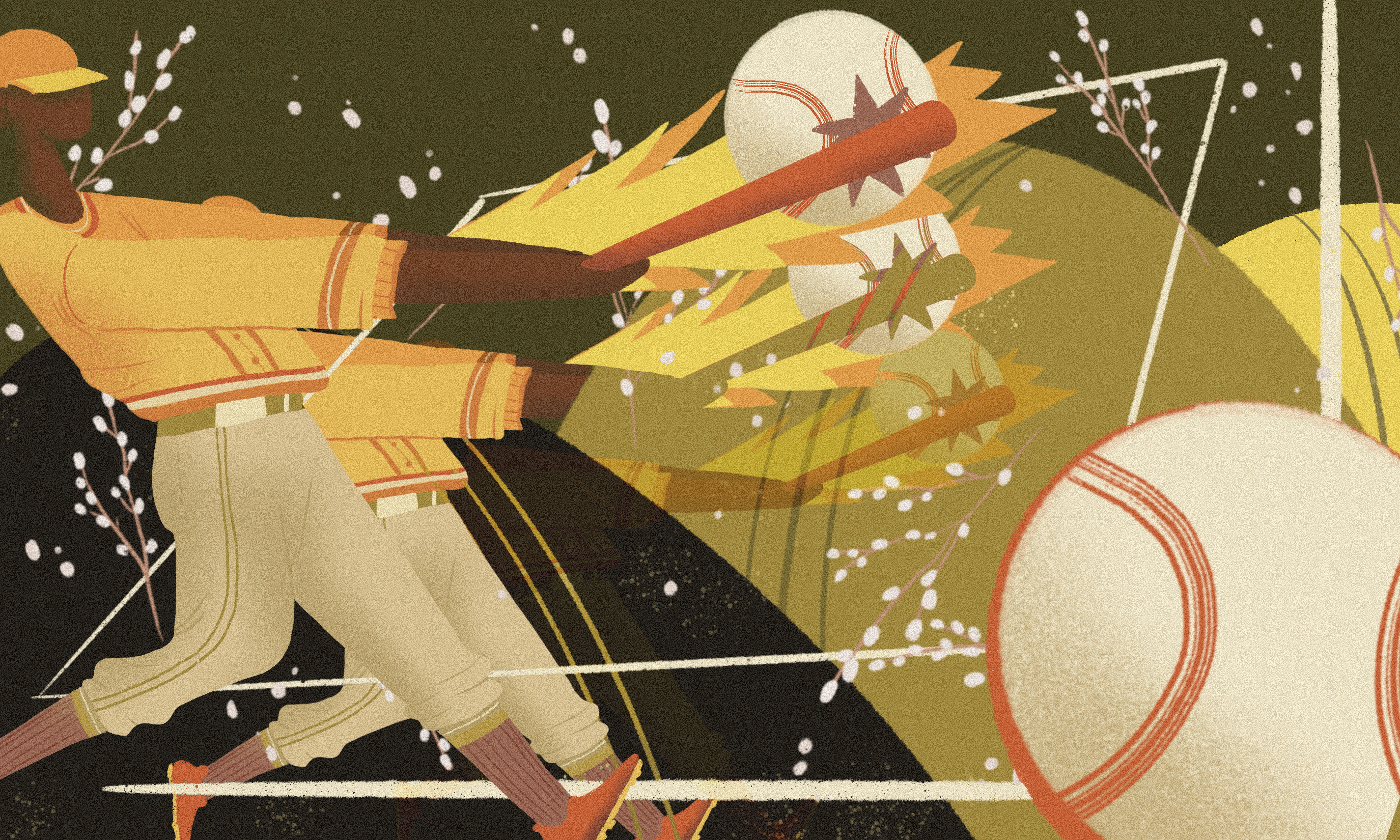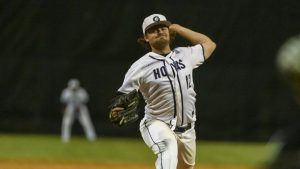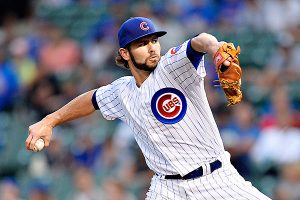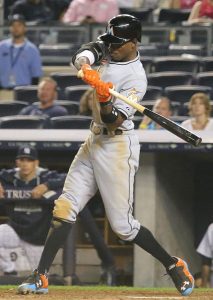It was October of 2020, and the world was still eerily quiet: a silent summer broken only by the two-minute serenade of pots and pans for the frontline workers at 7 p.m., with everyone stuck at home in their COVID-19 “pods” filling up the days with whatever they could. Marquis Grissom Jr. and his friends were no different.
“I mean, we were like everyone else,” he said. “Just trying to find something to do while we waited for the world.”
Marquis was 18 at the time, and the COVID-19 pandemic had delayed his matriculation to Georgia Tech, where he would excel as a pitcher and eventually become a Washington Nationals draft pick in 2022. But that was all in the future. For now, he was part of a group of eight up-and-coming baseball players from the metro Atlanta area that, with the help of Grissom’s father, had come to Fayetteville, Ga., to train. They were the inaugural “Hill Boys,” who, along with their three coaches, created a space for Black players with an ethos built on three tenets: hard work, imparting generational wisdom, and community.
From the very beginning, they would see just how much work they would need to put in. At the start of the first practice session, they were faced with a hill—literally. The hill wasn’t particularly steep, so craning your neck to see the top wasn’t necessary. But it was big: the size of an entire baseball field featuring a solid incline. One lap around the hill routinely left a myriad of Hill Boys splayed out on the grass, clutching their stomachs.
For the players, this was their first time getting acquainted with the hill, a spot that became their training ground for their pre-spring training workouts. But Marquis Grissom Sr. was deeply familiar with the hill, and the image is just as striking as when he first saw it years before.
The 17-year MLB veteran knew he found his piece of heaven in 35 acres of land in Fayetteville in 2004. But he also knew his family would want to live somewhere busier, so he turned it into a training facility, nicknaming it “The Hill.” The name pulls double duty. It describes the literal hill that defines the workout sessions, but it has also become a place of refuge for the next generation of Black baseball players, a group shepherded along by the older generation: three former MLB players—Marquis Grissom Sr., Marvin Freeman, and Lou Collier—with immense wisdom to share.
The Hill treats everyone the same way. Freeman, who played college baseball at Jackson State, knows plenty about exercising on hills; his university’s most famous alumni, Walter Payton, is well-known for conditioning by doing hill sprints. By the time Payton graduated, hill exercises became the norm for the Jackson State Tigers, so when Freeman describes players languishing on The Hill, this is his area of expertise. The Hill leaves people drenched in sweat, fumbling for water, trying to catch a quick break, every time. Seriously, every time. But, as Freeman told the Voice, “If you ain’t bent over, gasping for air, with a cramp in your side, saying you can’t go anymore, then you’re not putting the work in that’s necessary to make the kind of advancements that we’re looking for you to make.” These are the expectations when you’re a Hill Boy.
While Grissom Sr. and Collier work with the position players, Freeman works with the pitchers. The trio of veterans are passing along their knowledge at a unique point in baseball history: This is an era dominated more by numbers than anything else, but Freeman does not believe that numbers should be the only method for training.
His signifier is not numbers on a device. It’s his baseball eye.
“I have the eye to recognize if a slider is flat versus one that has got some bite on it,” Freeman said. “So I don’t need to look at the iPad after every pitch. Just having veteran pro players overseeing these up-and-comers with the ability to give on-the-spot, instantaneous advice that they can apply immediately is rare. You don’t see it anymore.”
“Now you got guys saying they’ll break down the analytics and meet in a day or two,” he added.
For a teacher like Freeman, that lost time is unacceptable. When you have four to six weeks in the lead-up to spring training, every minute counts. If he notices a flaw, he wants to fix it. Immediately.
This is all part of the “tried-and-true” method of teaching that constitutes the Hill Boys ethos. These aren’t old-school tactics, according to Freeman. “Baseball has been the same for 130 years. As long as a pitcher’s job is still to get outs, as long as the mound is 60 feet, six inches from the plate, it’s the same,” he said. So why not use the methods that have already worked?
Freeman points to his pre-spring training regimens as a member of the Atlanta Braves as a catalyst for success. When he was traded to Atlanta in 1990, pitchers were strongly encouraged—”It’s not mandatory, but you better be there”—to attend a three-week pre-spring throwing program with legendary pitching coach Joe Mazzone. Freeman’s career took off after he began annually participating in this program that would have him throwing at his top speed with full control by the time spring training began. This extra effort would help him set a club record for the Colorado Rockies with a 2.80 ERA in 1994, a record that stands today. Freeman believes that some of his success stemmed from being fully ramped up for spring training, and he’s brought that mentality to the Hill Boys.
This, like just about every other tale of the Hill Boys, is steeped in personal history.
Three years in, the teaching trio of Grissom Sr., Freeman, and Collier have already put the Boys on the path to success. Take Michael Harris II, for example. The self-described “tried-and-true” coaching style turned Harris into one of the most exciting young players in the MLB and last year’s NL Rookie of the Year. He plays for the Braves, carrying on the legacy of both Grissom Sr. and Freeman. His impact on the team, from his excellent hitting to his absurd catches in the outfield to his expressive headbands, all showcasing his particular showmanship and ability, makes him one of the most entertaining athletes in baseball. He credits his on-field success to the Hill Boys.
Jaylen Nowlin, another Hill Boy who currently pitches in the Minnesota Twins organization, recounts Grissom Sr. talking up Harris before he even debuted, declaring he would be dominating the bigs in no time. Grissom Jr. remembers this moment as well. “My dad, during COVID, said that Mike would take over the Braves outfield in two years. We all looked at him like he was crazy,” Grissom Jr. recalled. “Fast forward two years and he’s winning Rookie of the Year.”
To succeed at this level, this community hinges on love.
The Hill Boys love the hard work, the history they share, and, mostly, the game they play. The Hill Boys are rooted in classic Little League traditions: old teams, plastic trophies, dirt fields, and early wake-up times, building lasting, unbreakable friendships.
Grissom Jr. met Harris II and up-and-coming A’s prospect Lawrence Butler when he was eight years old at Sandtown Little League, and has known Nowlin since birth. The rest of the original eight met each other through travel ball. As kids, they all had dreams of the big leagues, and it’s already becoming reality. The guys can see the brass ring, now they just have to reach for it.
“Just having this group, with Mike leading us off, he’s going insane,” Grissom Jr. said of his best friends. “And he’s right here with us everyday, so we all know it’s possible to get to where we want to be.”
When a tree is uprooted, it dies. The same goes for human beings: We need roots. That’s what makes a strong community important. That’s what makes the Hill Boys important. In a sport dominated by analytics, statistics, and numbers, it is easy to forget the human element of baseball. The hours of practice, the importance of chemistry—these are people that have friendships over a decade old, from all across the state, with bonds created through countless hours in the dugout. Even when they spread out across the country when the season begins, the roots fostered on The Hill keep the Boys together.
It’s been only six months since the conclusion of a World Series that embarrassed Major League Baseball. For the first time in 72 years, it was played without a single American-born Black player. The participation of Black players in the MLB is at its lowest since the 1990s, and those involved with the Hill Boys are all cognizant of the importance of developing a safe space for Black kids to train and excel at baseball.
The original group of eight Hill Boys is just the first of many generations of Hill Boys to come. As more and more Black players join the fold (including big names like Chandler Simpson, Tink Hence, Jordan Walker, and Marc Church), the community continues to grow. But not just anyone gets the opportunity to work with the Hill Boys. “It’s something that’s voted on by all the guys that are there, the guys that understand how someone’s personality is,” Freeman explains. “If you’re coming here to work, they’ll give you that opportunity.”
The expansion continues to inspire Nowlin’s work ethic. “We’re competing against each other in drills just to see who can get done fastest. So the more people that want to work the better,” he said. Grissom Jr. used almost identical verbiage to describe his Hill Boys experience. As the group has expanded its talent pool, it’s also expanded its efforts in the community. This past November, the Hill Boys hosted their first Thanksgiving camp through Grissom Sr.’s baseball association. Kids who saw Harris II win Rookie of the Year got to listen to him—along with the rest of the Hill Boys and coaches—give instruction on the game they all love.
The kids may just be having fun, but Freeman sees the deeper impact, too: the influence of the Hill Boys on the next generation of ballplayers.
“I was talking to a kid a couple years ago about Ken Griffey Jr. getting elected to the Hall of Fame,” Freeman recalls. “The kid said, ‘Who’s Ken Griffey Jr.?’ That helped make me realize the importance of getting these kids into baseball and bridging the gap.” And that’s what the Hill Boys are doing. “The Hill Boys are the next generation, and we introduce them to the kids to show that these are the guys that are doing what you want to do, where you want to be. They will bridge the gap, and then down the road the next generation of Hill Boys can bridge the gap.”
He would love nothing more than to see a huge influx of Black participation in the major leagues—players with the same passion, hunger, and desire as the current crop of Hill Boys. But he thinks it may not happen in his lifetime. So instead, he focuses on the macro view: getting kids involved at a grassroots level. Nowlin and the rest of the Hill Boys share Freeman’s desire to give back. “Me and the original eight, we’ve already had discussions about our dreams of just coming back, and everybody setting up shop, but all of us working together,” he said. Through the Hill Boys, more Black kids are getting the opportunity to play and excel at baseball. That’s the vision.
At that point, when those kids decide to pursue the dream of making it to the show, they’ll be like many of the current Hill Boys. “We all have the same goal, we all want to get to the same place,” Grissom Jr. said. Where they’re trying to get to is the majors, the pinnacle of baseball. Some have already made it to the top of that hill, and the rest are raring to go.







